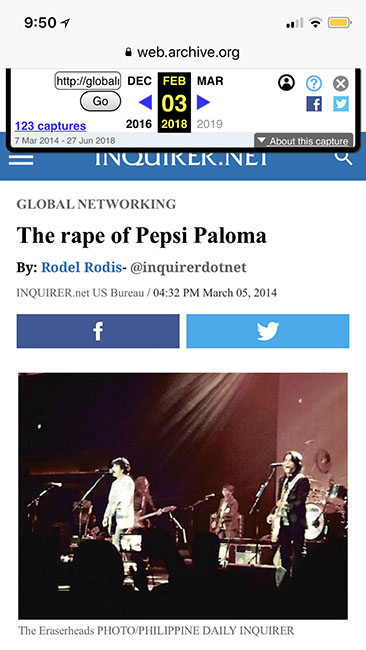On Inquirer’s takedown of Pepsi Paloma stories, a dangerous precedent
A few weeks ago, Senator Vicente “Tito” C. Sotto III requested Inquirer.net to take down articles linking him to the rape and killing of ’80s star Pepsi Paloma. Sotto said “these kinds of unverified articles have been negatively affecting my reputation for the longest time.” One of the perils of such publicity is the Streisand Effect, where the intention to remove a piece of information has the unintended consequence of publicizing the information more widely?. John Oliver points it out in his show “The Right to be forgotten” that the “the Internet is like quicksand. The more aggressively you fight to remove yourself from it, the deeper you’re going to sink down into it. “ Sotto might as well delete the internet because what goes online stays online.
The bad news is Inquirer gave in to Sotto’s demands and the bit of good news is that the Pepsi Paloma articles are on the web archives. Digital footprints are forever.
This did not sit well with many netizens. Let’s Organize for Democracy and Integrity or LODI expressed “grave disappointment and alarm at the Inquirer’s decision to take down three public interest articles about Pepsi Paloma from its website. This humiliating case of self-censorship sets a dangerous precedent adverse to press freedom, history and the cause of fighting child abuse in our country.
Like LODI, I admire and “salute the Inquirer’s brave journalists who are speaking out against the shameful cave in by the management and editorial board to the demands of Senate President Vicente Sotto III.”
It is a bad precedent. “Inquirer’s act is made more lamentable by the fact that no court ordered that the articles be taken down. The bosses of the news organization acted on the basis of a mere demand letter from a politician who misused the letterhead of the Senate Presidency, LODI added.
“What other stories would be taken down, we do not know. But what is clear is that the Inquirer buckled under pressure from a powerful politician who was given a chance to refute reports, dating from years back, that he interfered in a rape investigation, and whose statement was published by the newspaper.
If Sotto could do it to the Inquirer, what’s stopping any other public official from demanding takedowns of articles in other publications that they deem unpalatable like the Pepsi Paloma stories?
Press freedom and freedom of expression is about the people and their agents — journalists — freely and independently reporting on public figures. In this case, Inquirer turned these twin tenets backwards: letting Sotto decide freely what should come out or be taken down in their publication.
The law does not look kindly on take downs, especially those sought by government and the powerful: Only in accordance with the orders of a court, after due process, and with the strictest criteria.”
Meanwhile Mark Angelo Roma, Founding President, Young Filipino Advocates of Critical Thinking shared his thoughts:
What happened was truly unbecoming of a country that claims to have a vibrant democracy. Leaders must encourage all forms of information even if it potentially harms their image. Dissent is crucial if we want to live up to the ideals of a free nation. A working democracy is one that allows people to make many difficult decisions given the access to all forms of information. With what happened on Pepsi Paloma articles, it seems like the freedom of the press and the freedom of the Filipino people to access information is under attack. We cannot allow this. I urge all youth leaders and concerned individuals to take the necessary actions to defend what’s left of us.”
Ivan T. Sucgang, National Chairperson, Young Filipino Advocates of Critical Thinking added
The issue of the removal of Inquirer’s articles on the alleged involvement of Senate President Vicente Sotto III is deeply troubling for the press and youth members.
If we want to have a free marketplace of ideas, we should not allow government officials to influence which articles are available for access to the public. It simply shows that people in power would use their power to be able to paint the picture of an issue they want the people to see. This simply should not be the case if we want to foster critical thinking as the people should have the freedom to access all sources of information, even if it paints a certain individual or group of individuals in a bad light.
I call on youth leaders and campus journalists especially, to stand up and defend press freedom. In this day’s age of disinformation and fake news, we need to access more and more reliable sources of information and defend the integrity and independence of our press.”
The rule of law has become optional for Sotto and the president he serves. It is sad Inquirer surrendered without a fight.
Citizens must continue to stay vigilant, and defend our press freedom and freedom of expression.

